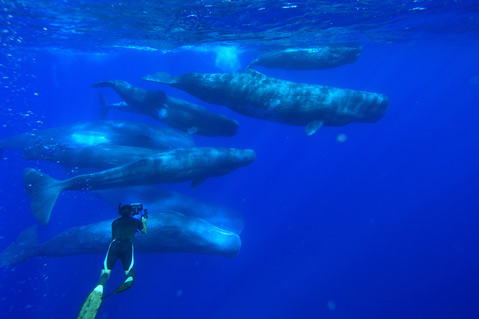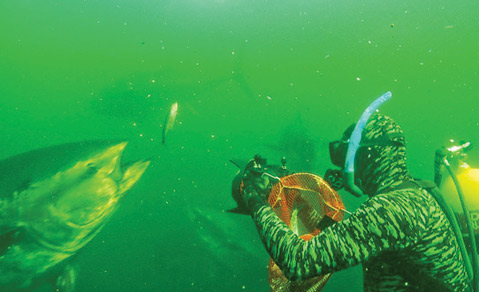S.B. Filmmaker Brings New Documentary to UCSB
Rick Rosenthal Explores Bluefin Plight, Deep Sea Beauty in Hot Tuna

Rick Rosenthal sees well beyond the Channel Islands from his home in Santa Barbara. His latest documentary film, Hot Tuna, follows the evolutionary anomaly of a deep sea fish known as the bluefin tuna. With experience as an oceanographer, marine biologist, and cinematographer, Rosenthal has pulled numerous nature films from the depths of the sea, including TV docs like Superfish and the Planet Earth series and features like Deep Blue. Since its premiere in May, Rosenthal’s Hot Tuna has been shown internationally to a growing audience, an estimated 10 million viewers at last count. It screens in Santa Barbara this Thursday, July 26.
Bluefin are massive, muscular, aerodynamic, and advanced, weighing in at up to 1,500 pounds and being one of the few warm-blooded fish in the ocean. Rosenthal would argue that the only way to understand these “legendary, magical fish in all their glory” is through the images in Hot Tuna. The film presents the mysterious and sparse bluefin in their natural environment, a laborious accomplishment that Rosenthal described last week via email: “Many times I have been called ‘lucky’ for what I have been able to capture on film. Yes, luck plays a part, but just plain old hard work and patience are key to my success in the ocean. Working in the open ocean requires a certain skill level and degree of competence that at times far exceeds normal diving.”

It seems these extra efforts and added struggles are inevitable hurdles for what Rosenthal aims to achieve. Unlike conventional scientific divers, Rosenthal does not reserve his findings for a research paper or an oceanography conference; he shares them with the world. He is undiscriminating about where his films are screened, which gives the public vital insight into new scientific methods and discoveries. Though Rosenthal has a background in science (he has published over 40 articles and research papers on various marine subjects), his documentary work uses film to capture more than just scientific perspectives on the ocean and its inhabitants. In a way, he presents the tuna as two creatures: one is a fish that impresses the boundaries of evolution with its notable efficiency and strength, the other a piece of mysterious oceanic artwork. In fact, Rosenthal sees this dichotomy across his whole body of study. “Everything in the ocean is art,” he explained, “and in clear oceanic water the light plays well on the screen.”
And the bluefin is very much a part of this oceanic masterpiece. Its coloration is said to be mosaic-like, and its interspecies interaction appears to make strange scaly pattern underwater. The two views of this fish offered in Hot Tuna are paired to show viewers what Rosenthal has long searched for. “[I want people to] see something for the first time,” he said. “I want them to be moved to protect, to love, to appreciate the ocean environment, even if they never experience it firsthand.” He says that “because of the motion,” films can move people the way static words cannot.
With Hot Tuna, Rosenthal hopes to stir up conversation about ocean conservation as well as protection for the bluefin tuna. Rosenthal calls his films “a visual record of a species or community of animals that possibly might be gone in our lifetime.” He sees a looming tragic end for these fish and is hoping his film can help save them, or at least save an image of them. But the real responsibility falls on the viewers. Rosenthal offers no concrete plan for saving the bluefin from latent endangerment in Hot Tuna but asks his viewers, instead, to take action. Though tuna do not yet appear on endangered species lists, for years they have been approaching dangerous overfishing levels and have been placed on Greenpeace’s “Red List.”
In fact, the bluefin proved so sparse and elusive that Hot Tuna took Rosenthal 13 years to film. Despite his qualified team of fishermen, biologists, and tuna trackers, the stars of Hot Tuna ultimately decided when to make themselves known. “You start to feel like everything is against you, the weather, the ocean conditions, and the appearance of animals that move with great speed and travel great distances,” he recalled. That Hot Tuna was completed is a testament to Rosenthal’s perseverance as both a filmmaker and an environmentalist, but it’s still only a fraction of the battle for the bluefin’s survival.
4•1•1
UCSB’s Pollock Theater will host a free screening of Hot Tuna on Thursday, July 26, at 7 p.m. Filmmaker Rick Rosenthal will be on hand to answer audience questions following the film. For event details and info, call (805) 893-4637 or visit carseywolf.ucsb.edu/pollock.



